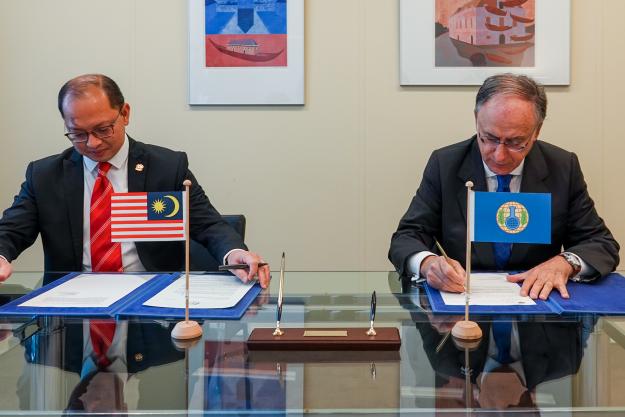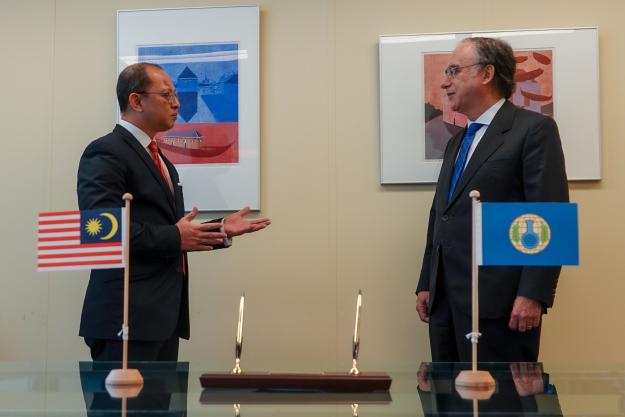
Dr Mohd Norhisyam Mohd Yusof, Chargé d’Affaires a.i. of the Permanent Representation of Malaysia to the OPCW and H.E. Mr Fernando Arias, OPCW Director-General
THE HAGUE, Netherlands–14 October 2020–The Government of Malaysia has contributed €10,000 to a special Organisation for the Prohibition of Chemical Weapons (OPCW) Trust Fund to support the project to upgrade the current OPCW Laboratory and Equipment Store. This project will result in the construction of a new facility, the OPCW Centre for Chemistry and Technology (“ChemTech Centre”).
The contribution was formalised during a ceremony between the Charge d’Affaires a.i. of the Permanent Representation of Malaysia to the OPCW, Dr Mohd Norhisyam Mohd Yusof, and OPCW Director-General, H.E. Mr Fernando Arias, which was held at OPCW Headquarters in The Hague.
Charge d’Affaires a.i. Dr Mohd Yusof remarked: “Malaysia views the upgrading of the current OPCW Laboratory and Equipment Store to the ChemTech Centre as a crucial step in strengthening the Organisation’s capabilities to comprehensively address new and re-emerging chemical weapons threats. The new ChemTech Centre will also catapult capacity-building efforts for OPCW Member States, particularly in developing countries. Malaysia, for instance, is interested in advancing our expertise as a nation and a regional player. As a highly principled and committed member of the OPCW, Malaysia stands ready to contribute to our joint efforts to end the use of chemical weapons.”

Dr Mohd Norhisyam Mohd Yusof, Chargé d’Affaires a.i. of the Permanent Representation of Malaysia to the OPCW and H.E. Mr Fernando Arias, OPCW Director-General
While thanking Malaysia for its contribution, Director-General Arias emphasised the importance of having Malaysia in the list of contributors and recognised the support of Malaysia to the OPCW.
The Director-General also renewed his appeal to all OPCW Member States in a position to make voluntary contributions to do so. He further emphasised the important role the new ChemTech Centre will play in strengthening the OPCW’s ability to address chemical weapon threats and enhance capacity building activities. He highlighted that “all contributions, regardless of size, are greatly appreciated”.
So far, 45 countries, the European Union, and three other donors have contributed or pledged to contribute financially to the ChemTech Centre project, and a considerable amount has been raised to date.
Background
The project to build the ChemTech Centre is on-going and seeks to strengthen the OPCW’s capabilities to fully address new and emerging chemical weapons threats, as well as to support capacity building in OPCW Member States. The current OPCW Laboratory and Equipment Store are central to the effectiveness and integrity of the verification regime of the Chemical Weapons Convention, and they also contribute to the OPCW’s capacity-building and international cooperation activities. However, the current facility will soon no longer be fit-for-purpose due to its ageing infrastructure, space constraints, larger workloads, and new missions with new areas of work.
A new facility is required to meet the demands of OPCW Member States for enhanced verification tools, improved detection capabilities and response measures, as well as increased capacity-building activities. The ChemTech Centre will also help the OPCW to keep pace with developments in science and technology and new chemical weapons threats. The OPCW Technical Secretariat is developing a detailed project plan for the construction of the ChemTech Centre, and a Trust Fund for voluntary contributions has been established to secure the required resources for the project.
To date, the following Member States have contributed or pledged to contribute to the project: Algeria, Andorra, Angola, Australia, Bangladesh, Belgium, Canada, Chile, China, Cyprus, Czech Republic, Estonia, Finland, France, Germany, Greece, Hungary, Indonesia, Ireland, Italy, Japan, Kazakhstan, Lithuania, Luxembourg, Malaysia, Morocco, the Netherlands, New Zealand, Pakistan, Peru, Poland, Portugal, the Republic of Korea, Romania, Slovakia, Slovenia, Spain, Sweden, Switzerland, Thailand, Turkey, United Arab Emirates, United Kingdom of Great Britain and Northern Ireland, and the United States of America. The European Union, Israel and other donors have also contributed.
As the implementing body for the Chemical Weapons Convention, the OPCW, with its 193 Member States, oversees the global endeavour to permanently eliminate chemical weapons. Since the Convention’s entry into force in 1997, it is the most successful disarmament treaty eliminating an entire class of weapons of mass destruction.
Over 98% of all declared chemical weapon stockpiles have been destroyed under OPCW verification. For its extensive efforts in eliminating chemical weapons, the OPCW received the 2013 Nobel Peace Prize.
